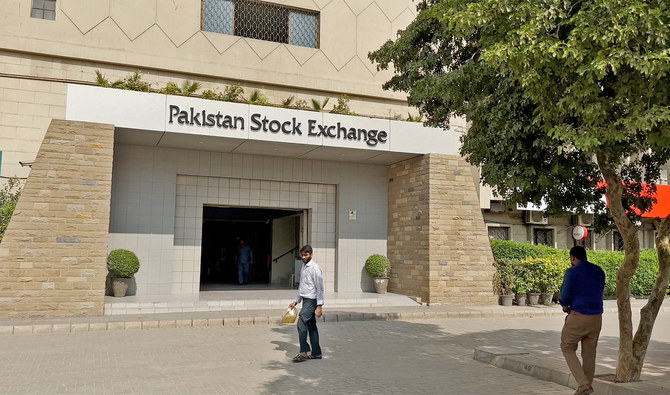KARACHI: Pakistan’s equity market and securities watchdog are all set to launch a one-window digital platform to issue online-only broker licenses in a bid to attract new investors, including venture capitalists (VCs), fintechs, and other startups, said a senior stock exchange official on Thursday.
The Securities and Exchange Commission of Pakistan (SECP) approved a regulatory framework for online-only brokers earlier this year in May by amending the Pakistan Stock Exchange (PSX) Rulebook.
The platform, named Online-Only Broker License, is designed to ensure customer onboarding, trade execution and provision of support services through electronic means only.
“This is an opportunity to set up a unique and different business model for the brokerage industry,” Raeda Latif, head of marketing and business development at PSX, told Arab News on the sidelines of an event to comprehensively explain the initiative.

Pakisan Stock Exchange's managing director, Farrukh Khan (left), and head of marketing and business development, Raeda Latif, chair a meeting in Karachi, Pakistan on November 17, 2023. (AN photo)
Latif explained that investors interested in fintechs providing payment solutions and looking to expand their presence in Pakistan’s domestic investment environment can opt for this license.
“They can set up their own businesses,” she added. “Even VCs can invest in potential startups or [fund] entrepreneurs who are looking to establish their business in the brokerage industry.”
The PSX official remarked that the platform would be “very agile” and provide a lean model, allowing companies to conduct their entire business digitally, including reaching out to investors, placing orders, executing trades and closing accounts.
The online brokers would require a PSX Trading Right Entitlement Certificate (TRE) by submitting a fee of Rs1.25 million and demonstrating a minimum net worth of Rs7.50 million.
They will also have to pay Rs50,000 to secure a license from the SECP.
Latif noted that recently, over 80 percent of investor accounts at PSX had been opened online, with 60 percent from various small cities in the country.
Speaking at the occasion, PSX managing director Farrukh H. Khan said the stock exchange would also facilitate the auction of government debt securities like treasury bills and Pakistan Investment Bonds (PIBs), allowing the general public to invest in them by using small amounts.
“With the auction of the government debt securities, the common man will be able to invest and trade in the securities with small investments,” he told the media.
Khan informed the PSX and the State Bank of Pakistan (SBP) would jointly float debt securities soon.
Currently, the government debt securities are only auctioned by the SBP through a network of about 10 banks working as primary dealers, which the SBP also regulates.
The PSX chief said that all 200 stockbrokers and some 40 Pakistani banks would participate in the buying and selling of government debt securities at the bourse after the initiative was implemented.
Khan also maintained that Pakistan’s equity market was performing well, trading at new all-time highs following recent policy measures taken by the government to fulfill the International Monetary Fund’s conditions and an expected fall in interest rates.


























